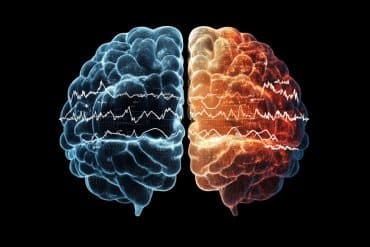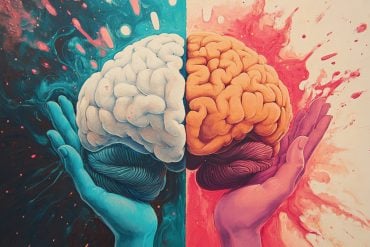Summary: Neurons that secrete oxytocin in the paraventricular nucleus in the hypothalamus are responsible for activating paternal instincts in new fathers, a mouse model study finds.
Source: RIKEN
The radical flip in attitude of male mice toward pups on the birth of their own offspring—from aggressive to nurturing—stems from the hormone oxytocin, RIKEN neuroscientists have discovered. This surprising finding could also have implications for human fathers.
A mature male mouse that has never mated will often attack and even kill pups, but the same mouse can become a doting father on the birth of its own young. The neurological basis for this transformation, which is seen in many other animals, has been a mystery until now.
Kazunari Miyamichi at the RIKEN Center for Biosystems Dynamics Research is intrigued by this and other examples of rewiring in the brain. “One of the most fascinating aspects of the brain is its ability to change in response to previous experience and the specific demands of a life stage,” he says.
“This neuroplasticity is caused by alterations in the strengths of synaptic connections, but it’s generally tough to pinpoint which neurons or neural circuits undergo a plastic change upon any biological event.”
Now, in a mouse study published in Neuron, Miyamichi and his co-workers have shown that neurons that secrete oxytocin in a brain region called the paraventricular nucleus in the hypothalamus are responsible for activating the paternal instincts of new fathers.
This discovery unlocked a slew of surprises for Miyamichi, who himself flipped from studying the neuroscience of smell to that of fatherhood on becoming a father.
For a start, he didn’t anticipate that a single factor, oxytocin, would have such a strong effect on fathers.
“While females experience many physiological and endocrinological changes to their bodies on becoming mothers, any neuro-endocrinological changes in males were thought to be subtle or non-existent,” he says.

“But we found that oxytocin—a hormone associated with childbirth and lactation—exerts a strong effect in male mice.”
Another totally unexpected aspect of the finding was the plasticity of neural circuits in the hypothalamus.
“The functions of the hypothalamus are generally thought to be mediated by hard-wired neural circuits that never change once established,” explains Miyamichi. “Our work is one of very few recent studies that show functional and structural plasticity in the hypothalamus.”
There could be repercussions for human fathers. “One study has reported that human fathers who experience more skin-to-skin contact with their children tend to have elevated levels of oxytocin in their blood,” says Miyamichi. “And so we speculate that oxytocin plays significant roles in human fathers as well.”
The team now intends to explore both the mechanisms that give rise to the neural plasticity of fathers and how oxytocin facilitates caregiving behaviors in fathers.
About this neuroscience research news
Author: Press Office
Source: RIKEN
Contact: Press Office – RIKEN
Image: The image is credited to Nick Bergkessel/Science Photo Library
Original Research: Closed access.
“Plasticity of neural connections underlying oxytocin-mediated parental behaviors of male mice” by Kengo Inada et al. Neuron
Abstract
Plasticity of neural connections underlying oxytocin-mediated parental behaviors of male mice
Highlights
- OT is indispensable for the parental caregiving behaviors of male mice
- OT neurons evoke caregiving behaviors in virgin males partly via the OT ligand
- Trans-synaptic tracing shows enhanced connectivity from LHA → OT neurons in fathers
- This structural plasticity can support behavioral plasticity
Summary
The adult brain can flexibly adapt behaviors to specific life-stage demands. For example, while sexually naive male mice are aggressive to the conspecific young, they start to provide caregiving to infants around the time when their own young are expected. How such behavioral plasticity is implemented at the level of neural connections remains poorly understood.
Here, using viral-genetic approaches, we establish hypothalamic oxytocin neurons as the key regulators of the parental caregiving behaviors of male mice.
We then use rabies-virus-mediated unbiased screening to identify excitatory neural connections originating from the lateral hypothalamus to the oxytocin neurons to be drastically strengthened when male mice become fathers. These connections are functionally relevant, as their activation suppresses pup-directed aggression in virgin males.
These results demonstrate the life-stage associated, long-distance, and cell-type-specific plasticity of neural connections in the hypothalamus, the brain region that is classically assumed to be hard-wired.






